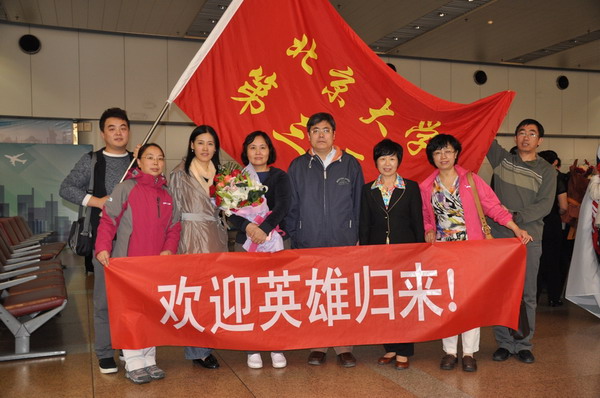In the eye of the outbreak
By Liu Zhihua ( China Daily ) Updated: 2014-11-01 07:40:42
 |
|
Yao's colleagues welcome her home at Beijing Capital International Airport. |
The original team was assigned to work in the country for two years, and Yao was charged with leading the group. In August, before the team arrived in the country, the Guinean government announced a nationwide state of emergency as part of a series of measures aimed at containing the disease. Conakry has a high prevalence of diseases, such as malaria and AIDS/HIV, due to poor sanitation and a lack of medical institutions.
Yao's team lived at the China-Guinea Friendship Hospital, and their main tasks included providing training on disease control and prevention to local medical staff and people working in Chinese enterprises. They attended regular meetings at the World Health Organization's Sub-regional Ebola Outbreak Coordination Center, which is based in Conakry, and relayed information about the outbreak back to China.
Yao's team also treated patients at the hospital in Conakry, which before the outbreak was home to more than 20,000 Chinese. More than half have since left, she says.
The group works 24-hour shifts every five days, treating hundreds of patients. Many are unsure whether they have Ebola or a different infectious disease. In the early stages, patients with Ebola show no signs of the disease, Yao says.
The living conditions of local people are poor, and mosquitoes and fruit bats help spread disease. The fruit bat is believed to be the natural host of Ebola virus. "I used a lot of anti-mosquito spray. Chinese people there even told me they dared not have a haircut or see a dentist," Yao says.
"Now that I think of it, it was quite dangerous, living in an epidemic-stricken area and meeting so many people."
Yao says she messaged her daughter every day, assuring her that she was safe. "I'm very grateful for the time difference between Beijing and Conakry/Birmingham," she says. "Otherwise, I would have had to engage in conversation with my daughter, and would not have been able to successfully hide the truth from her."
She also didn't tell her daughter about the pain in her right leg she developed while in Guinea. Her right leg became swollen and ached, and Yao feared it could be a sign of thrombus, a type of blood clot.
"I took medicines I had brought from Beijing, and I was lucky not to have severe thrombus or a stroke there," Yao says.
Yao and her two fellow doctors returned to Beijing on Oct 12. Yang Dongping, a publicity official with Yao's hospital, told China Daily she has declined many media interview requests because she doesn't want her daughter to know where she really went.
Yao says she has followed news reports about the Ebola outbreak closely since returning to Beijing. "I now feel connected with people I met there, and I hope they will be all right," Yao said.
Contact the writer at liuzhihua@chinadaily.com.cn
|
|
|
|
|
|
|
|

























 Raymond Zhou:
Raymond Zhou: Pauline D Loh:
Pauline D Loh: Hot Pot
Hot Pot Eco China
Eco China China Dream
China Dream China Face
China Face






